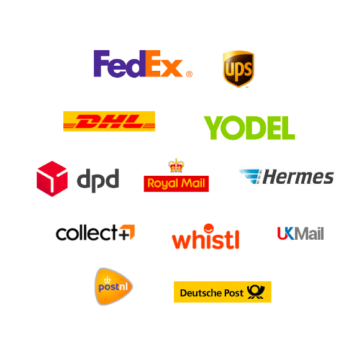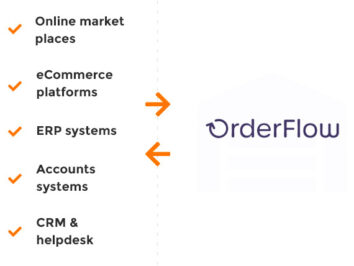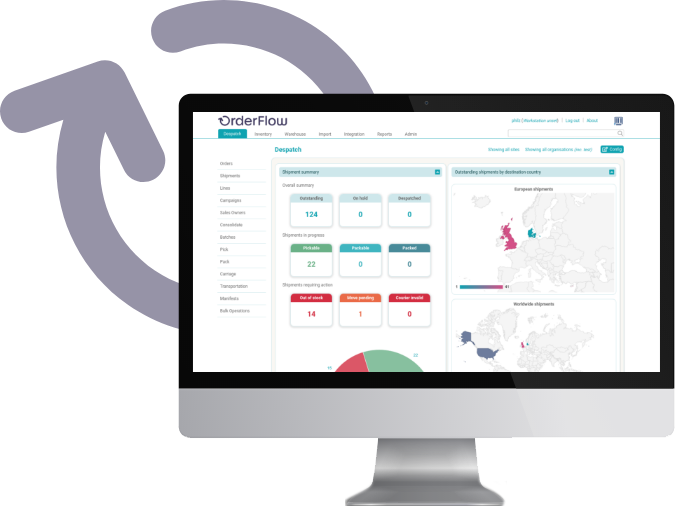OrderFlow WMS Integrations
OrderFlow WMS offers a range of integration options for exchanging data with other platforms. This includes a powerful integration framework that ensures your data can flow seamlessly between OrderFlow and other systems that need to interact with your warehouse operations. This includes e-commerce integrations, courier integrations, TMS integrations, accounts systems integrations and MRP & ERP integrations
For more complex integrations, our support team will provide technical assistance or undertake the integration for you.
What systems will you need to integrate with?
When choosing the right WMS for you and your business, there are a number of different business areas that your warehouse operations may need to integrate with to maximise the benefits and savings your WMS delivers:
1. e-commerce platforms
Integration between your WMS and e-commerce platforms will enable you to synchronise the data between the systems and improve your day-to-day processes. Live data feeds should ensure that accurate inventory information is fed to your e-commerce site or sites to avoid overselling and stockouts.
Orders can be automatically pulled into your WMS without any manual time-consuming data entry and quickly pushed into the fulfilment processes to increase turnaround times. If you are using more than one e-commerce platform, the WMS can update the available stock figures across all platforms whenever an order is received. OrderFlow allows different business rules to be applied to orders from each of your sales channels while still allowing them to be grouped together in your picking and packing processes to optimise the efficiency of your fulfilment operations.
The real-time data feeds on orders received, order status and inventory levels will provide your warehouse team leaders with the information they require to proactively manage the warehouse processes.
Integration between your WMS and e-Commerce platform will also ensure product details from your website are reflected in your WMS without any manual re-keying.
2. Courier integrations
The ability to dispatch orders to your customers as quickly and as cost-effectively as possible is fundamental to your current and future profitability. This means that you need to constantly review the performance and cost-effectiveness of your carriers and switch if there is a business advantage. For many organisations, it will make economic sense to use multiple carriers and choose from their different services depending on the requirements of individual jobs. The ability to integrate your WMS with the courier platforms becomes vitally important to your business.
It is not just about delivery costs, there are other factors that affect your productivity when dealing with couriers. Automated processes for validating shipments, producing labels, managing cut-off times and tracking service levels all play a part in deciding which couriers are the best match for your business.
3. ERP, MRP and accounts system
Many organisations choose to utilise a specialist WMS alongside an ERP/MRP or accounts system as their requirements are too complex for the system’s basic WMS modules. For this to work effectively, there is a critical need to synchronise and pass up-to-date information between the two systems to eliminate the need for duplicate data entry and reconcile information.
Integrating with accounts systems enables you to manage inventory costs more effectively and produce comprehensive invoice information. It also enables you to create expert reports for forecasting and purchasing requirements.
4. Transport Management System (TMS)
These systems are used to help plan and coordinate the transportation of both incoming and outgoing stock while ensuring that the correct paperwork is produced. They also provide the ability to automatically exchange shipment details, carrier details, tracking information and delivery status.
5. Analytics and reporting tools
There is a great deal of valuable information that can be harnessed from your WMS which many organisations export into business intelligence and analytics tools. This information is then used for forecasting, planning and purchasing as well as improving business processes.
Did you know, supermarkets and the beauty industry lead the way in positive delivery reviews?
Complex integration versus simple plug-and-play integrations
Integrating your WMS with third-party systems can significantly increase the efficiency of your warehouse operations. However, the more complex the third-party system you are integrating with, the more complicated and time-consuming the integration will be. Designing an effective integration between two platforms is not simply a ‘plumbing’ exercise that allows data to be transferred between environments, it requires careful consideration of how that data is used in both platforms and what business logic needs to be embedded in the processes the systems support. This is a very important consideration, particularly if you don’t have a great deal of in-house expertise or resources. When choosing your next WMS consider whether all you need is a simple data exchange or whether you are looking for support in the design and configuration of end-to-end processes that span two or more platforms.
Simple integrations
Many entry-level WMS offer “plug & play” integration with a wide variety of third-party platforms and very low costs. This type of solution works well if your requirements are very straightforward and are unlikely to change. If your business is growing and you need to implement more complex integration such as special offer promotions through your e-commerce platforms or integration with ERP systems then this type of solution will become a problem. Many organisations are forced to revert to inefficient workarounds or spend large amounts of time and money on development costs trying to upgrade their integrations.
Complex integration
There are a number of companies that offer integration services and platforms that bridge between systems which are a good solution in many cases. Alternatively, more powerful and flexible WMS vendors will provide support for complex integrations via their development teams.
OrderFlow WMS integration
At OrderFlow we offer a highly tailored service and match each integration solution with our client’s requirements. We understand that some customers do not have the resources or technical expertise to configure new integrations, while others prefer to do the work themselves. We provide comprehensive WMS support for all integrations and upgrades.
We offer a wide range of standard integrations to all the leading e-commerce platforms and UK couriers.
If you are a growing business your integration needs are going to change as your operations become more complex. OrderFlow offers the tools and support needed to ensure that your warehousing and fulfilment operations are always closely integrated with the other parts of your business.


